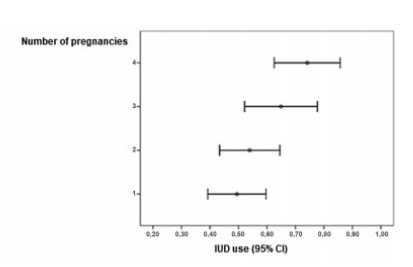Summary
Revista Brasileira de Ginecologia e Obstetrícia. 2022;44(2):154-160
To analyze the profiles of women who accepted and who refused the insertion of the copper intrauterine device (IUD) postpartum and to learn the motivations related to the refusal of the method.
Cross-sectional study with 299 pregnant women. The women were informed about the possibility of inserting a copper IUD postpartum and were questioned about their interest in adopting or not this contraceptive. All participants answered a questionnaire with information relevant to the proposals of the present study. The sample size was limited to the number of devices available for the present study.
A total of 560 women were invited to join the present study and 299 accepted. Out of the 299 women included in the present study, 175 accepted the copper IUD and 124 refused. As the number of pregnancies increased, the IUD acceptance rate raised (p=0.002), especially between the groups with 1 and with ≥ 4 pregnancies (p=0.013). Regarding the desire to havemore children, the women who planned to have more children were more likely to refuse the method than the ones who did not (p<0,001).
Women with multiple pregnancies and desire to not have more children were more likely to accept the copper IUD. The profile of those who refused was first pregnancy and desire to have more children. Among the three most frequent reasons reported for copper IUD rejection, two responses stood out: no specific justification and desire to have more children.
